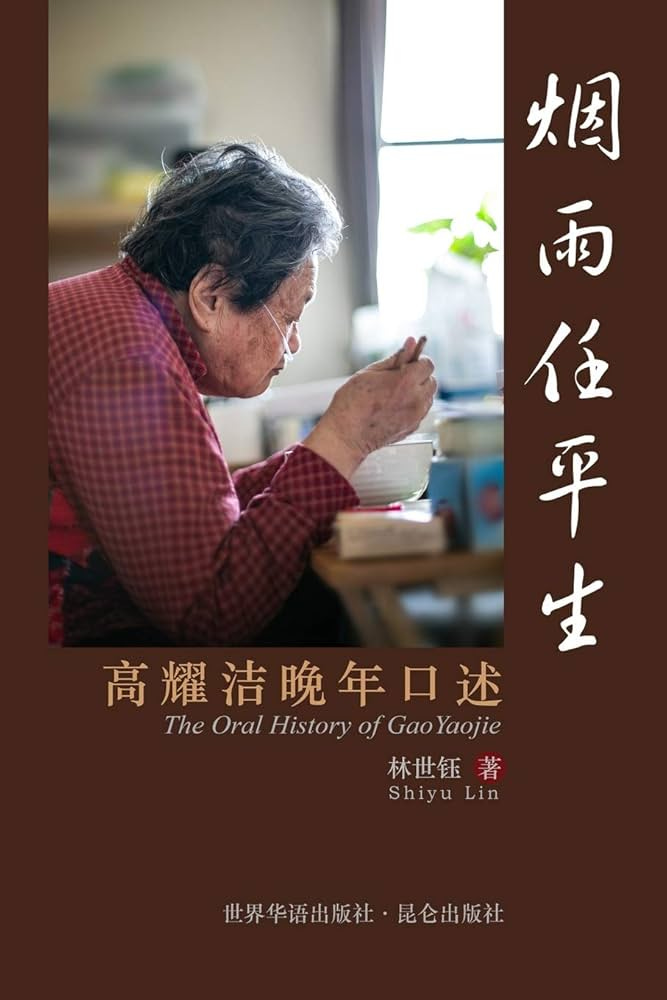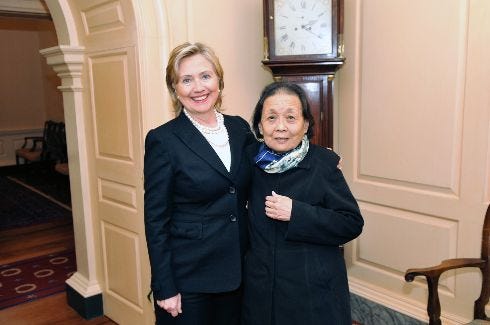Source: China Unofficial Archives (8/12/25)
Gao Yaojie Through Rain and Mist: The Late-Life Monologue of a Noble Soul in Exile
By Bi Shu
[中国民间档案馆 China Unofficial Archives is a reader-supported publication. To receive new posts and support our work, please consider becoming a free or paid subscriber at the above link.]

The cover of Through Rain and Mist: The Oral History of Gao Yaojie.
In 1996, when 69-year-old retired doctor Gao Yaojie met a rural woman diagnosed with AIDS during a consultation, she had no idea this moment would redefine her life. Starting with this woman, who had been infected through a blood transfusion, Gao began a years-long investigation into the tragedies of impoverished farmers contracting AIDS from blood stations and the government’s culpability. Her persistent efforts exposed the truth of the “Henan blood disaster” to the world, indirectly preventing the catastrophe from spreading further.
The problem had started in the early 1990s. To generate revenue for its healthcare system, the Henan provincial government encouraged rural residents across the province to sell blood to “get rich and escape poverty.” This aggressive development of a “plasma economy” led to the construction of a large number of blood stations. Many of these stations were privately contracted and, to cut costs, failed to screen for Hepatitis B and HIV before blood collection. They also allowed multiple people to share needles and even mixed blood components before reinfusing them back to donors. As a result, HIV spread rampantly through blood sales and transfusions among the rural poor.
Gao was not the first to discover the spread of AIDS through the Henan blood banks. As early as 1993, Henan’s health department discovered that AIDS was spreading among blood donors. In 1995, Wang Shuping, head of a clinic in Zhoukou, Henan Province, had already investigated the scandal and produced a report, but her findings were suppressed by officials. When Gao began her in-depth investigation in 1996 and funded her own AIDS prevention campaigns, she bravely and persistently spoke out amidst official pressure. These efforts were disseminated by China’s media, which was more independent in that era, and was noticed by the international community. The publicity ultimately made the Henan blood scandal known worldwide.
Gao, however, paid a heavy price. In August 2009, at over 80 years old, she left China for the United States, beginning a life in exile. From then until her death in Manhattan in December 2023, she was not able to return to her cherished homeland.
After escaping government surveillance, Gao continued to speak out about China’s AIDS epidemic. In her later years, she authored several memoirs, including The Soul of Gao Yaojie: A Memoir, Gao Yaojie’s Recollections and Reflections, and Gao Yaojie Remembering the Past, all of which are a testament to her life. She spent most of her time in the turbulent 20th-century China, enduring a life of hardship. Born in 1927, she had her feet bound as a child, attended a traditional private school, and fled during wartime. She worked as a gynecologist for decades and suffered greatly during the Cultural Revolution.
In China, she was named a “Person of the Year” by China Central Television in 2003 and nominated for the same award by Southern Weekend. In 2004, Southern People Weekly listed her as one of “Fifty Public Intellectuals Influencing China.” Internationally, she received the Jonathan Mann Award for Global Health and Human Rights in 2001, was named an “Asian Hero” by Timemagazine in 2002, and had asteroid 38980 named “Gaoyaojie” in 2007.
However, Gao’s heroic stature often overshadowed her humanity as an ordinary person. Her biography, Through Rain and Mist: The Oral History of Gao Yaojie, offers a uniquely intimate perspective and precious material for understanding Gao, covering not only her stories as a doctor and advocate for AIDS patients but also her rarely discussed yet complicated relationship with her family, her lesser known experiences in exile in New York City, and her emotions and inner thoughts as she battled illnesses toward the end of her life.
The book’s author, Lin Shiyu, was a journalist in China for many years before moving to the U.S., where she has documented the lives of Chinese people living abroad. To write Through Rain and Mist, she visited Gao’s apartment near Columbia University dozens of times for in-depth interviews. In her later years, Gao was often bedridden and hospitalized with serious illnesses, and many conversations had to be conducted through written notes. The author organized Gao’s oral accounts and notes to present her life in the U.S. and thoughts.

Gao Yaojie with Hillary Clinton, who helped to facilitate Gao’s trip to the U.S. for an award ceremony in 2007.
After embarking on her journey to help AIDS patients, Gao witnessed their despair and the countless families destroyed by the disease, leaving many children orphaned. This experience made her empathize with the pain of the victims and fueled her determination to speak the truth.
Through Rain and Mist provides a detailed account of Gao’s visits and her care for AIDS orphans. Still, after the book was published, Gao stated, “I didn’t do anything great. What I did is what everyone should do.” Yet, the reality is that only a very small number of people actually did what everyone should have done. In the book’s appendix, Liu Qian, a researcher at the Henan Academy of Social Sciences, mentioned in an article that many people knew about the AIDS epidemic at the time, especially local government employees, but they were indifferent.
Liu’s article records a village doctor saying, “It was confirmed in 1999 that many people had AIDS, but we weren’t allowed to talk about it. Now it’s public in the village because it can’t be hidden, but it’s still not public to the outside world. I’m a village doctor, a government employee, so I have to be consistent with the government. Otherwise, the cadres will criticize me and say that if I don’t want to do it, I can just go home!”
In contrast, when faced with the choice between speaking out and remaining silent, Gao always chose the humane way. She said in an interview, “Because you are human, a human being should protect human interests.” Between humanity and an authoritarian system, she chose humanity, thereby placing herself in opposition to the system. It was this respect for human existence that made her not only a whistleblower but also a long-term adversary of the system, using her own resources to help countless patients and orphans.
While Gao’s efforts couldn’t change the system—the Chinese government’s concealment of the initial SARS and COVID-19 outbreaks was nearly identical to the official attitude toward the AIDS epidemic—she showed us how a brave and sincere person, under immense systemic pressure, can still choose the power of humanity and do the right thing. This power belonged not only to Gao but also to others who quietly worked for AIDS patients and orphans. Their continuous efforts salvaged some dignity for the dead, ensuring they didn’t perish silently without anyone knowing about their suffering.
The book recounts that in 2007, when Gao was awarded the Global Women’s Leadership Award by the U.S. organization Vital Voices, the Chinese government initially tried to prevent her from traveling to the U.S. to accept it. It was only after Hillary Clinton personally intervened that the Chinese government relented. After Gao returned, local authorities intensified their surveillance and even pressured her family to silence her, which is why she left for the U.S. in 2009.
In her later years, amidst illness and loneliness, Gao still thought of the AIDS orphans and the dying patients she had seen. In conversations with Lin, she would get emotional and cry every time she mentioned the victims.
Through Rain and Mist is unique because its oral history format preserves a wealth of personal emotions and inner monologues. This detailed emotional record provides readers with a deeper understanding of Gao—her sense of justice stemmed from the classical texts she read as a child, including teachings like “neither riches nor honors can corrupt, neither poverty nor a humble condition can change, neither mighty force nor power can bend.” Even in her later years, she could still recite classics like the Book of Songs and the Mencius. This shows that her life philosophy of “taking the world as one’s own responsibility” was formed early on. Her unyielding character remained unchanged in her old age, a striking contrast to her frail body.
The book also documents Gao’s relationship with her family, a topic rarely discussed in her other works. According to Gao’s oral accounts, reveals that during the Cultural Revolution, because she would not submit to the persecution of the Red Guards due to her family background as landowners, her 13-year-old son, Guo Chufei, was falsely accused of being a “counter-revolutionary” and imprisoned for three years, becoming the youngest political prisoner in Henan Province. After her retirement, when she dedicated herself to AIDS prevention, the government placed immense pressure on her children to silence her, which significantly affected their lives and strained their familial bond. During her interviews, the author was able to document the emotional interactions between Gao and her children when her daughter came to care for her and her son visited.
One particularly memorable scene in the book is Gao’s 90th birthday celebration. Lin and a friend prepared a birthday cake for her. Although she had long been afflicted with illness, Gao showed good spirits on that day. She had dedicated her life to others, and the joy of that day seemed to truly belong to her. These details make Gao’s later life more vivid, making readers feel as if they are sitting by her bedside, listening to her tell her stories. As she said, these stories, including the tragedies, needed to be told as her contribution to later generations.
Recommended archive:
Lin Shiyu: Through Rain and Mist: The Oral History of Gao Yaojie
Related archives (all by Gao Yaojie):
The Soul of Gao Yaojie: A Memoir (English version available for purchase online)
Gao Yaojie’s Recollections and Reflections
Gao Yaojie Remembering the Past
Ten Thousand Letters: Gao Yaojie’s Observations on the Living Conditions of AIDS and STD Patients
